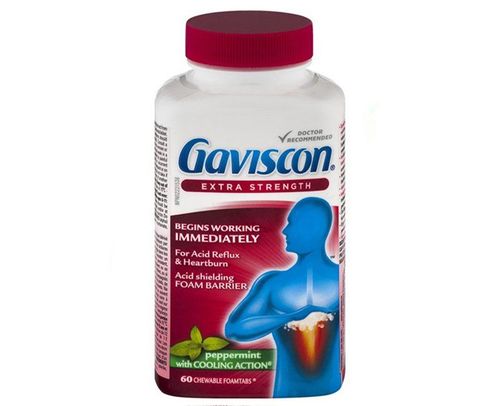This is an automatically translated article.
The article was professionally consulted by Dr. Le Thu Phuong - Department of Pediatrics - Neonatology - Vinmec Hai Phong International General Hospital.Gastroesophageal reflux disease (GERD) is a digestive disorder that occurs when acidic gastric juices, or food and other liquids, back up into the esophagus. Gastroesophageal reflux is a common problem in all ages, especially in children.
1. Causes of gastroesophageal reflux in children
There are many causes of gastroesophageal reflux in children, among which the main causes are as follows:For many children, the stomach is not fully developed, leading to a small, horizontal stomach. and taller than adults, so they often have reflux.
Problems related to the lower esophageal sphincter are also one of the causes of acid reflux. Normally, the sphincter opens to allow food to enter the stomach and closes to keep food in the stomach from backing up. However, in young children, this activity is often unstable, so food is easy to back up into the esophagus.
Some baby foods are small and liquid, so it's easy to get out when openings appear.
Some children often have the habit of eating and then lying down, which is not only good for the stomach but also easy to cause reflux.
In addition, the cause of gastroesophageal reflux may originate from a number of other diseases that affect the contractile function of the stomach and digestive tract such as enteritis, infection, allergy, ...

2. Signs of gastroesophageal reflux in children
The most common symptom of GERD in children is heartburn. Heartburn can last up to 2 hours and tends to be more severe after a meal. In addition, in children, gastroesophageal reflux may have some other symptoms such asVomiting often occurs after the child has finished eating; In some cases, children may choke or wheeze if the fluid backs up into the trachea and lungs; Frequent burping or hiccups; Symptoms of vomiting food or liquid sour stomach persist even when the child is over 1 year old; The child is irritable or fussy after eating; Sometimes even anorexia or eating in small amounts; No weight gain, malnutrition, chronic anemia; Older children may feel pain in the sternum.
3. Complications of gastroesophageal reflux that children may experience
Gastroesophageal reflux, if not treated promptly, can lead to dangerous complications such as: Gastroesophageal reflux often causes breathing problems when acid overflows into the trachea, lungs or nose; The child may experience swelling and burning in the esophagus; In addition, more dangerous children can bleed into the esophagus.4. How to treat gastroesophageal reflux in children?

Reflux, if there are no complications, do not need treatment, but follow these instructions:
Do not give too much milk to the baby in one feeding, in the middle of the feeding period. breastfeeding parents should pause to pat the baby's back to burp After feeding, hold the baby upright for 20-30 minutes before laying down; Thicken milk with its own formula, in case breast milk is not available, it is possible to choose the type of milk for children with reflux; When a baby is suspected of having a cow's milk protein allergy, remove dairy foods from the mother's diet if the child is breastfed. Children should be protected from exposure to tobacco smoke. If your child's symptoms do not improve, the doctor may prescribe medication. For children over 1 year old:
Do not give your child certain foods such as caffeine, chocolate and mint because of the increased risk of acid refluxing into the esophagus; acidic foods and drinks such as carbonated soft drinks, orange juice and spicy foods... Elevate the head of the bed or raise the baby's head to sleep, this can help relieve heartburn at night. Teach children not to lie down after eating, each meal should be spaced about 3 hours before bedtime. In children who are overweight or obese, losing weight can help reduce reflux. In addition, children may also need drug treatment as well as surgical methods to control reflux. When seeing that a child has abnormal symptoms, parents should take the child to a medical facility for timely examination and treatment.
Currently at Vinmec International Hospital, pediatric patients will be examined by a team of pediatricians, immunoallergists, gastroenterologists and examined by gastrointestinal endoscopy to diagnose accurately diagnose gastroesophageal reflux in children as well as other digestive disorders
Vinmec Hospital is equipped with medical equipment synchronously with the most modern flexible endoscopic system of Olympus today Japan - the world's leading quality prestige manufacturer. Along with that, the wire system and tools used during endoscopy are treated with absolute sterility according to international standards to avoid the risk of infection. The foot pedal irrigation system helps the doctor to take the initiative in irrigating the patient's gastrointestinal tract.
Along with that is a team of qualified doctors: Doctor CKII Tran Van Quang - Pediatrician, Vinmec International General Hospital. With more than 30 years of experience in gastrointestinal endoscopy, there are many researches, treatments, undergraduate and postgraduate teaching on gastrointestinal, hepatobiliary diseases in children.
Gastrointestinal endoscopy helps to accurately diagnose the patient's digestive diseases, help give the right treatment regimen, intervene in time, and limit the occurrence of complications.
Please dial HOTLINE for more information or register for an appointment HERE. Download MyVinmec app to make appointments faster and to manage your bookings easily.














